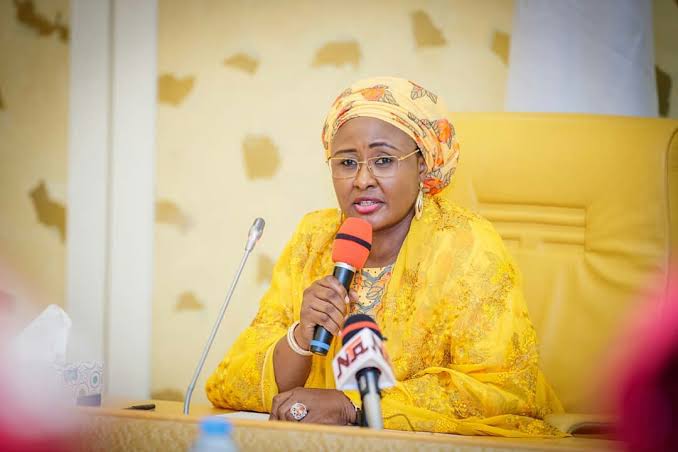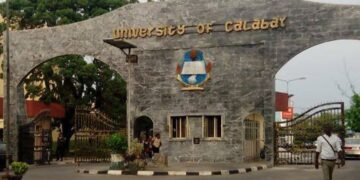Wife of the President, Mrs Aisha Buhari, has flagged off the construction of Armed Forces Post Traumatic Service Disorder (PTSD) Centre and pledged to commission the centre by May 2023.
She recalled her experiences of living with a retired military personnel without rehabilitation despite his ordeals that traumatised him and having to fail in his presidential bid for three consecutive times before eventually winning in 2015.
Speaking at the ground-breaking ceremony at the Muhammadu Buhari Cantonment, she commended the initiative by the Defence and Police Officers Wives Association (DEPOWA) but said it was the federal government’s responsibility to care for the mental health of its personnel.
She said PTSD as a mental health condition is triggered by the terrifying event, adding that it is a reality that many soldiers and military families have to live with.
“I understand the challenges associated with PTSD and its impact on military families and the nation. My husband served the Nigerian army for 27 years before he was overthrown by a coup d’etat. He fought a civil war for 30 months without rehabilitation. He ruled Nigeria for 20 months and he was detained for 40 months without any nature of offense.
“One year after he came out from detention, we were married. I clocked 19 years as his wife in his house, legitimately. So I suffer the consequences of the PTDS, because having gone through all these at the age of 19, to handle somebody who is a former President of Nigeria and the Commander-in-Chief of the Nigerian Armed Forces. To tell the person that he is wrong. To tell him that he is wrong is the first mistake that you are making. So at the age of 19, I had to figure out how to tell somebody of his calibre that he’s wrong or he is right. And that was the beginning of my offence in his house.”
The First Lady while calling on aggrieved politicians to embrace peace disclosed that her husband only became president when his ambition became a movement.
“And contesting elections, 2003 to fail, 2007, 2011 and all without rehabilitation. I became a psychotherapist.
“And finally, the whole nation raced against it, against the misuse of power and bad governance.
“He only succeeded when it became a movement and here we are today. He ruled Nigeria before and is ruling Nigeria now and this is the last and the final.
“Failing elections three times was a big blow to every contestant and also those that have protested just yesterday, simple primary elections, they’re still living in a trauma. You know the condition, which I tried to console them, I tried to talk to them, and some of them switched off their phones up till today, just for a primary election.
“You can imagine myself handling somebody at the age of 19, handling somebody that went through a war, coup d’etat and then elections, up on elections and then finally getting to the Villa 2015.
“Also, to tell them that this is wrong, this is right in Nigeria or in Africa in general, for a woman to tell a man it’s a problem. In that case. I want to use this opportunity to appreciate members of the armed forces for their sacrifices and contributions to the national building.”
She said while many service personnel paid the supreme price, others were either wounded physically or mentally.
“And we want to let them know that the whole nation is with them. The Centre for PTSD is important to members of the armed forces and beyond because soldiers are its primary victims affecting their relationships with colleagues, friends and loved ones as well as work and productivity, therefore fundraising is not a solution.”
She said the federal government that sent the soldiers to fight should take responsibility in taking care of their mental health after returning from the warfront.
“The soldiers that suffered from PTSD also are the responsibility of the whole armed forces. They should access from their budgets and build this centre. Mrs Irabor, it is no longer your project. It’s my project and the project of Mr. President. We’re going to work around the clock to make sure that the centre is built and commissioned before we leave office by the grace of God”.
Earlier in her welcome remarks, the DEPOWA president, Mrs Vickie Irabor, said the project was informed by her past experience of being married to a service personnel and stories from the barracks community.
She recalled “More than 20 years ago in Lagos, I stood with my five-year-old son waiting at the military wing of the Murtala Mohammed Airport, Ikeja with many thoughts running through my mind. Will my husband return to me alive, will he be injured, will I need to make life adjustments to cope with any issue we would face once the reality or outcome before me was known?
“Two years before this moment, my husband was deployed to Liberia and then to Sierra Leone under the auspices of ECOMOG to fight the war that later stabilized these countries. After such a long time away without much contact, I got the message that he was finally to return home. This was a long time before GSM phones and other communication tools were available in Nigeria and so my confirmation of life would only come if I saw him walking down the ramp of that C130 military aircraft.
“As I stood there that fateful sunny day, the first set to get off the plane were the bodies of our fallen heroes, wrapped up and my heart broke! Next set were wounded soldiers who were carried down from the plane with stretchers, with limbs wrapped up with white gauze, with shouts of excruciating pain, as they were laid on the soft green grass to be taken to Yaba Military hospital.
“Still, my husband was nowhere in sight and my thoughts went very far. I continued to wait and then the men who had survived this ordeal began to disembark. Finally, I saw him, though in quite an unrecognisable state. He had gotten considerably darker with extremely dry skin, but all these did not stop me from bowing my heart to thank God for bringing him back home, alive.
“Fast forward to my present role as president DEPOWA over two decades later and leading an association of women bound together by marriage to military and police officers in Nigeria, I was confronted by the image of that moment of waiting at the foot of the aircraft. It kept coming back and I allowed myself to think deeply not only about my experience that day, but that of my husband, the injured men, the wives who became widows, the children who became fatherless, the personnel who had to leave the service as a result of their injury, the trauma the men, the wives and children must have experienced and the many years that have passed with these unspoken experiences not discussed.
“The effects of these experiences in our barracks community and the extreme burden it placed on military families have kept me wondering “how did we survive these experiences as a community because they remained unspoken, unheard, and therefore untreated” I realized that indeed, all of us, the officers and men, wives and children were true victims of war and peacekeeping.”





